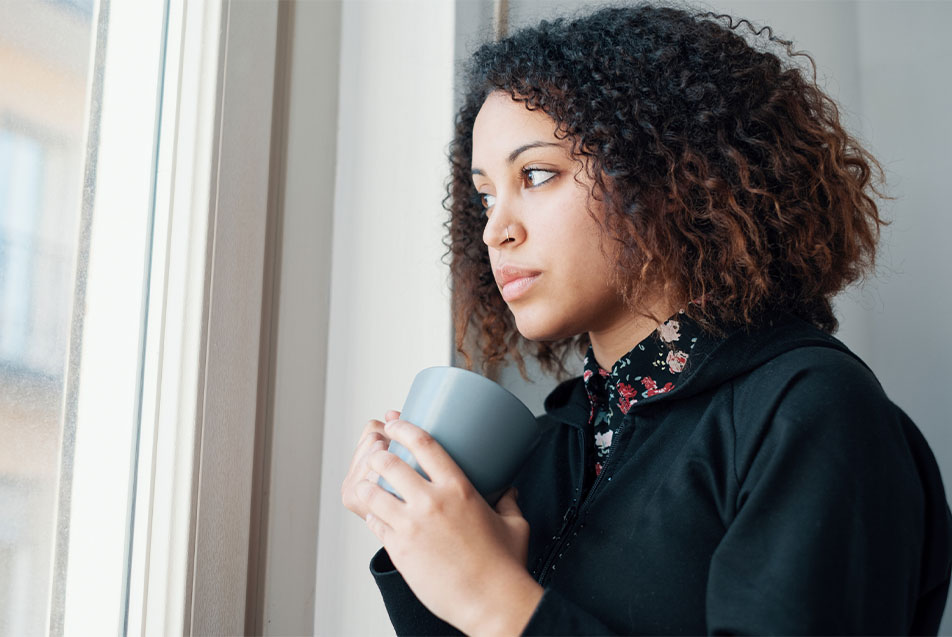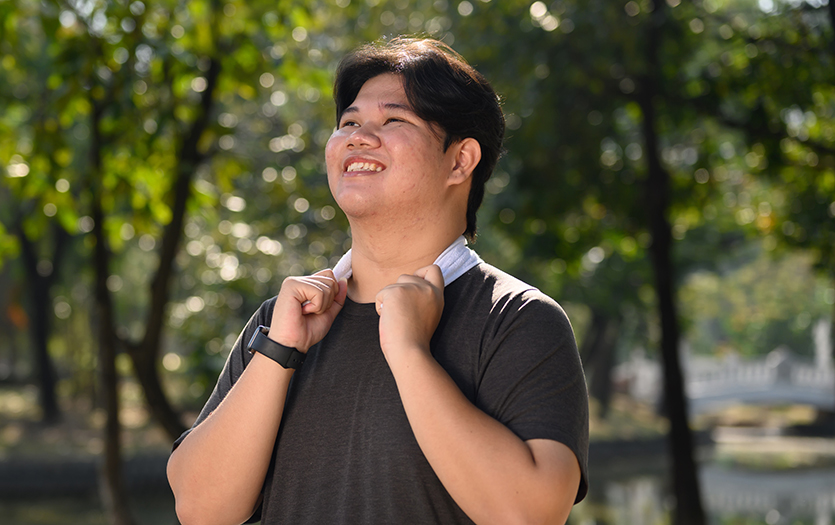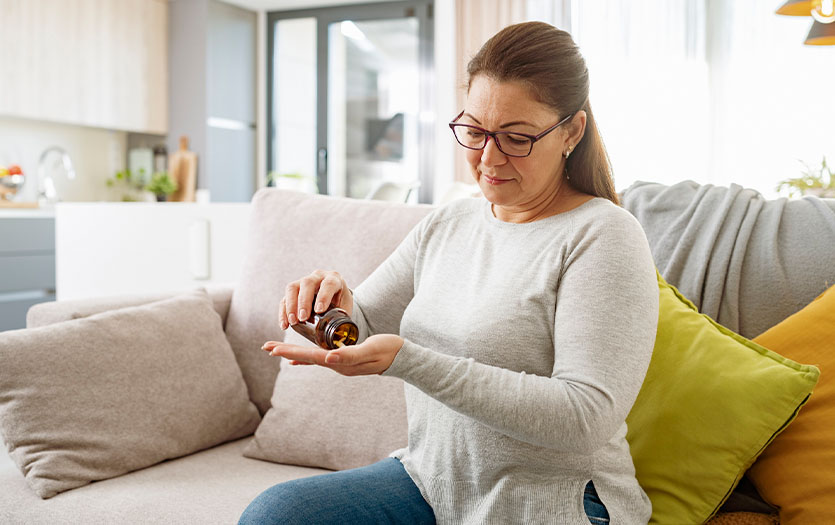
This post was written by Courtney Washington, Psy.D, CSAYC, HSPP, clinical training director, Park Center, an affiliate of Parkview Behavioral Health Institute.
What is Seasonal Affective Disorder (SAD)?
Seasonal Affective Disorder (SAD), is a form of depression that typically is recurrent around the winter solstice when days are shorter. It begins and ends with specific seasons for at least 2 years. This means seasonally you will experience a bout of depression or depressive episode, then as the season passes you go into remission. Once that season returns, you will dip back down into the depressive state. Unfortunately, this happens more seasons than not over your lifetime and while SAD is most common in the winter, it can occur in summer.
How do you know if you have SAD?
SAD mostly centers on low mood and a lack of energy, but other common signs and symptoms associated with SAD could include:
- Feeling sad
- Irritability
- Crying frequently
- Tired and/or lethargic
- Difficulty concentrating
- Sleeping more than normal
- Lack of energy
- A decrease in activity levels
- Withdrawal from social situations
- Craving carbohydrates and sugars
- Weight gain due to overeating
Bottom line, if you are concerned or struggling, don’t hesitate to consult your primary care provider or mental health professional. Remember, you are your own expert. You know what’s typical or normal for you.
What causes SAD?
There’s limited research to support the causation of SAD, but scientists suggest it’s related to multiple factors including:
- Serotonin levels: The neurotransmitter in your brain that regulates mood, appetite, digestion, sleep memory, sexual and social behaviors. So, if you have less serotonin it makes sense that you will experience lower mood, problems with sleep patterns, etc.
One study also suggests that we have higher levels of the protein SERT, in the winter. This protein aids in the transport of serotonin. However, the higher levels of protein have shown to slow the transport which hinders absorption, leading to lower levels of serotonin activity.
- Melatonin levels: Melatonin is a hormone produced by the pineal gland that responds to darkness by causing sleepiness. As winter days become darker, melatonin production increases, leading you to feel sleepy and lethargic. Melatonin helps to regulate your sleep patterns and is usually released in the evenings. The release pattern for adults typically happens around 9 p.m. or 10 p.m., but for teenagers, their brains don’t start the release of melatonin until closer to 1 a.m.
- Circadian Rhythms: This is your 24-hour clock that regulates your sleep/wake cycles. These are often triggered by seasonal changes and the length of the day. For people struggling with SAD, the circadian signal that indicates a seasonal change in day length has been found to be timed differently, thus making it more difficult for their bodies to adjust.
- Vitamin D: Also believed to play a role in serotonin activity, Vitamin D deficiency and insufficiency have been associated with clinically significant depressive symptoms. Less outdoor exposure to sunlight on the skin in winter leads to receiving and absorbing less Vitamin D. People with SAD may also produce less Vitamin D.
Who does SAD affect?
Depression, in general, seems to affect women more. SAD, in particular, is four times more likely to affect women than men and the age of onset is estimated to be between 18 and 30 years. Also, those living farthest from the equator, in northern latitudes, are more susceptible.
Something to think about: Does depression actually affect women more or is it a gender bias in what we think depression looks like? A lot of times, in men and teenage boys, we see depression looking more like agitation, irritability and anger as opposed to the traditional sadness, crying and struggles with motivation.
Home and self-help tips for beating SAD?
In addition to a treatment plan, small lifestyle changes can make a big difference. A few strategies you could choose from include:
- Engaging in activities that make you feel good.
- Exercise! Physical activity or any kind of movement is one of the best natural ways to cope with SAD. Exercise is also one of the most underutilized anti-depressant.
- Regular and consistent sleep/wake cycles.
- Engage in good sleep hygiene. Have a bedtime routine, it’s not just for kids. Turn off all screens and electronics (phones, tablets, televisions, etc.) about 2 hours before bed. The screens emit a blue light that mimics sunlight, triggering your brain to stay awake.
- Try eating foods that boost serotonin levels and are high in vitamin D and Tryptophan. This could include kiwi, dark chocolate, seeds, nuts, egg yolks, many types of fish and cheese. There’s also a correlation to gut health and mental health. Avoid processed food, processed sugars and simple carbohydrates. Make sure you’re fueling your mind and body with quality food.
- Plan a trip to a sunny destination before the winter and lack of motivation sets in.
- Practice self-compassion and self-awareness.
- Engage in positive self-talk.
When should I consult my doctor?
If symptoms are impacting your ability to function, carry out necessary tasks and disrupting your daily life, you should consult your primary care provider or mental health professional. If you’re having thoughts of hurting yourself or others you should seek medical intervention right away. In case of an emergency visit the Park Center Walk-in Clinic.
Possible treatments for SAD
Medication
- Selective Serotonin Reuptake inhibitors (SSRIs)
- Some research suggests that starting early in the season prior to depressive onset can prevent a recurrence.
Phototherapy
- A lightbox that filters out ultraviolet rays.
- It requires 20 - 60 minutes, typically in the morning.
- Is contraindicated with certain medications.
- Side effects can be less severe than medication. It can lead to mania or increase suicidal ideation early in treatment and should be monitored by a professional.
Vitamin D
- Taking supplements can help manage symptoms.
- Taking before the winter darkness sets in can be preventative.
- Adverse reactions are rare, but make sure you are monitored by a professional.
Counseling
- Always helpful. There are a lot of different modalities, but cognitive behavioral therapy and/or talk therapy are both effective modalities.
Important and helpful tips regarding SAD
- Begin preparing early and develop healthy habits in the spring, summer and fall.
- Disconnect from the internet. We are plugged in all the time and greatly underestimate the negative effects that social media can have on our daily lives.
- Try different things, find what works for you and make sure you enjoy doing it.
- Regularly connect with people on a face-to-face basis. Relationships drive us as human beings.
- Be patient with yourself and have compassion.
If you, or a loved one, are in need of support or treatment for SAD, please contact the Parkview Behavioral Health Helpline at 260-373-7500 or 800-284-8439 anytime 24/7. For immediate mental health care concerns, visit the Park Center Walk-in Clinic, located at 2710 Lake Avenue, Fort Wayne, 8 a.m. – 10 p.m., Monday through Sunday.



